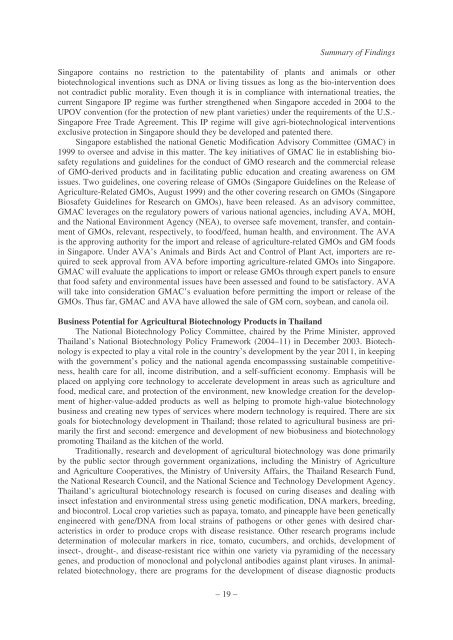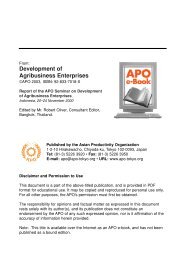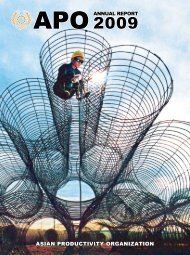Business Potential for Agricultural Biotechnology - Asian Productivity ...
Business Potential for Agricultural Biotechnology - Asian Productivity ...
Business Potential for Agricultural Biotechnology - Asian Productivity ...
You also want an ePaper? Increase the reach of your titles
YUMPU automatically turns print PDFs into web optimized ePapers that Google loves.
– 19 –<br />
Summary of Findings<br />
Singapore contains no restriction to the patentability of plants and animals or other<br />
biotechnological inventions such as DNA or living tissues as long as the bio-intervention does<br />
not contradict public morality. Even though it is in compliance with international treaties, the<br />
current Singapore IP regime was further strengthened when Singapore acceded in 2004 to the<br />
UPOV convention (<strong>for</strong> the protection of new plant varieties) under the requirements of the U.S.-<br />
Singapore Free Trade Agreement. This IP regime will give agri-biotechnological interventions<br />
exclusive protection in Singapore should they be developed and patented there.<br />
Singapore established the national Genetic Modification Advisory Committee (GMAC) in<br />
1999 to oversee and advise in this matter. The key initiatives of GMAC lie in establishing biosafety<br />
regulations and guidelines <strong>for</strong> the conduct of GMO research and the commercial release<br />
of GMO-derived products and in facilitating public education and creating awareness on GM<br />
issues. Two guidelines, one covering release of GMOs (Singapore Guidelines on the Release of<br />
Agriculture-Related GMOs, August 1999) and the other covering research on GMOs (Singapore<br />
Biosafety Guidelines <strong>for</strong> Research on GMOs), have been released. As an advisory committee,<br />
GMAC leverages on the regulatory powers of various national agencies, including AVA, MOH,<br />
and the National Environment Agency (NEA), to oversee safe movement, transfer, and containment<br />
of GMOs, relevant, respectively, to food/feed, human health, and environment. The AVA<br />
is the approving authority <strong>for</strong> the import and release of agriculture-related GMOs and GM foods<br />
in Singapore. Under AVA’s Animals and Birds Act and Control of Plant Act, importers are required<br />
to seek approval from AVA be<strong>for</strong>e importing agriculture-related GMOs into Singapore.<br />
GMAC will evaluate the applications to import or release GMOs through expert panels to ensure<br />
that food safety and environmental issues have been assessed and found to be satisfactory. AVA<br />
will take into consideration GMAC’s evaluation be<strong>for</strong>e permitting the import or release of the<br />
GMOs. Thus far, GMAC and AVA have allowed the sale of GM corn, soybean, and canola oil.<br />
<strong>Business</strong> <strong>Potential</strong> <strong>for</strong> <strong>Agricultural</strong> <strong>Biotechnology</strong> Products in Thailand<br />
The National <strong>Biotechnology</strong> Policy Committee, chaired by the Prime Minister, approved<br />
Thailand’s National <strong>Biotechnology</strong> Policy Framework (2004–11) in December 2003. <strong>Biotechnology</strong><br />
is expected to play a vital role in the country’s development by the year 2011, in keeping<br />
with the government’s policy and the national agenda encompasssing sustainable competitiveness,<br />
health care <strong>for</strong> all, income distribution, and a self-sufficient economy. Emphasis will be<br />
placed on applying core technology to accelerate development in areas such as agriculture and<br />
food, medical care, and protection of the environment, new knowledge creation <strong>for</strong> the development<br />
of higher-value-added products as well as helping to promote high-value biotechnology<br />
business and creating new types of services where modern technology is required. There are six<br />
goals <strong>for</strong> biotechnology development in Thailand; those related to agricultural business are primarily<br />
the first and second: emergence and development of new biobusiness and biotechnology<br />
promoting Thailand as the kitchen of the world.<br />
Traditionally, research and development of agricultural biotechnology was done primarily<br />
by the public sector through government organizations, including the Ministry of Agriculture<br />
and Agriculture Cooperatives, the Ministry of University Affairs, the Thailand Research Fund,<br />
the National Research Council, and the National Science and Technology Development Agency.<br />
Thailand’s agricultural biotechnology research is focused on curing diseases and dealing with<br />
insect infestation and environmental stress using genetic modification, DNA markers, breeding,<br />
and biocontrol. Local crop varieties such as papaya, tomato, and pineapple have been genetically<br />
engineered with gene/DNA from local strains of pathogens or other genes with desired characteristics<br />
in order to produce crops with disease resistance. Other research programs include<br />
determination of molecular markers in rice, tomato, cucumbers, and orchids, development of<br />
insect-, drought-, and disease-resistant rice within one variety via pyramiding of the necessary<br />
genes, and production of monoclonal and polyclonal antibodies against plant viruses. In animalrelated<br />
biotechnology, there are programs <strong>for</strong> the development of disease diagnostic products
















